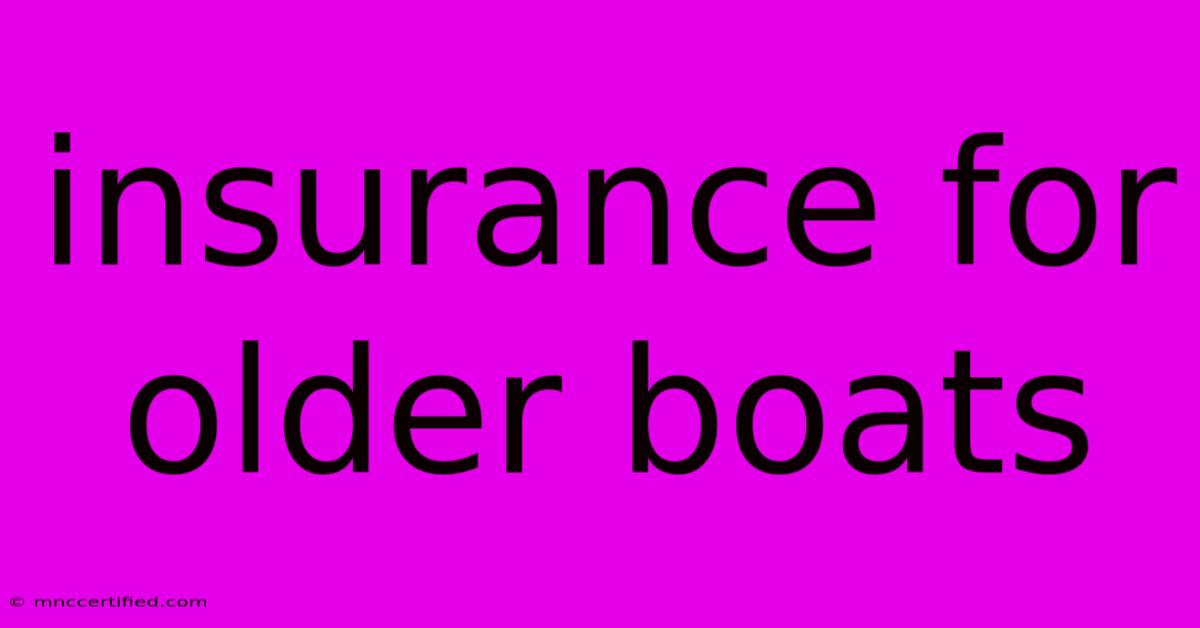Insurance For Older Boats

Table of Contents
Insurance for Older Boats: Navigating the Waters of Coverage
Finding the right insurance for your older boat can feel like navigating a stormy sea. While newer vessels often attract standard policies, insuring a classic or well-loved older boat presents unique challenges. This comprehensive guide will help you chart a course to secure adequate coverage, understanding the specific risks and considerations involved.
Why Insuring an Older Boat is Different
Unlike newer boats with readily available market values, older vessels present several complexities for insurance providers:
-
Depreciation: The biggest hurdle is depreciation. Older boats lose value significantly over time. Insurers consider this when determining the agreed value, which is the amount they'll pay out in a total loss scenario. This agreed value is often negotiated and may be considerably less than what you initially paid.
-
Parts Availability: Repairing an older boat can be more expensive and time-consuming due to the difficulty in sourcing parts. Some parts might be obsolete or require specialized craftsmanship, driving up repair costs. Insurers factor this into their risk assessment.
-
Higher Risk Profile: Older boats, especially those lacking regular maintenance, may have a higher risk of mechanical failure or structural issues. This increases the likelihood of claims and, consequently, higher premiums.
-
Limited Documentation: Lack of thorough maintenance records or original documentation can make it difficult to prove the boat's condition and value, impacting the insurance assessment.
Types of Insurance Coverage for Older Boats
Several types of insurance policies cater specifically to older boats. Understanding these options is crucial for making an informed decision:
Agreed Value Insurance: The Crucial Choice
This is arguably the most important type of insurance for an older boat. Instead of relying on fluctuating market values, you and the insurer agree on a specific value for your boat before the policy commences. This guarantees you'll receive that agreed-upon amount in the event of a total loss, regardless of market fluctuations. Negotiating a fair agreed value is key. Having a professional appraisal can significantly strengthen your position.
Agreed Value with Actual Cash Value (ACV): A Compromise
Some insurers offer a hybrid approach: agreed value with ACV for partial losses. While your total loss is covered by the agreed value, partial losses are compensated based on the actual cash value of the repairs, taking depreciation into account.
Liability Coverage: Essential Protection
Regardless of the age of your boat, liability insurance is crucial. This protects you from financial responsibility if you cause damage to another vessel or injury to someone else. This is usually a mandatory component of most boat insurance policies.
Additional Coverage Options
Consider these add-ons for comprehensive protection:
- Uninsured Boater Coverage: Protects you if another boater without insurance causes damage to your vessel.
- Collision Coverage: Covers damage to your boat resulting from a collision.
- Hull Coverage: Protects against damage to your boat's hull from various perils.
- Emergency Towing and Assistance: Provides coverage for unexpected breakdowns and towing services.
Finding the Right Insurer for Your Older Boat
Securing the best insurance for your older boat requires diligent research:
- Specialize Insurers: Search for insurers specializing in classic or antique boats. They often have a better understanding of the unique risks and valuation challenges involved.
- Detailed Boat Information: Prepare a comprehensive inventory of your boat, including maintenance records, photos, and any relevant documentation. This helps insurers accurately assess its value and risk profile.
- Multiple Quotes: Obtain quotes from several insurers to compare premiums and coverage options. Don't solely focus on the lowest price; ensure adequate coverage meets your needs.
- Read the Fine Print: Carefully review the policy documents to understand the terms, conditions, exclusions, and limitations.
Protecting Your Investment: Maintenance and Documentation
Proper boat maintenance significantly influences your insurance premiums and claim settlements. Maintain detailed records of all repairs, maintenance, and upgrades. This demonstrates responsible boat ownership and can positively impact the agreed value assessment.
By understanding the intricacies of insuring an older boat and taking proactive steps, you can secure the right coverage to protect your valuable asset and enjoy the waters with peace of mind. Remember, proactive preparation and thorough research are your best tools in navigating this specific insurance landscape.

Thank you for visiting our website wich cover about Insurance For Older Boats. We hope the information provided has been useful to you. Feel free to contact us if you have any questions or need further assistance. See you next time and dont miss to bookmark.
Featured Posts
-
Alonsos Return Mets Lineup Powerhouse
Dec 10, 2024
-
Post Apocalyptic Horror 28 Years Laters Zombie Reveal
Dec 10, 2024
-
Trump Steps Down Senate Ambitions Rise
Dec 10, 2024
-
Are You Currently Insured
Dec 10, 2024
-
Ai In Insurance Use Cases
Dec 10, 2024